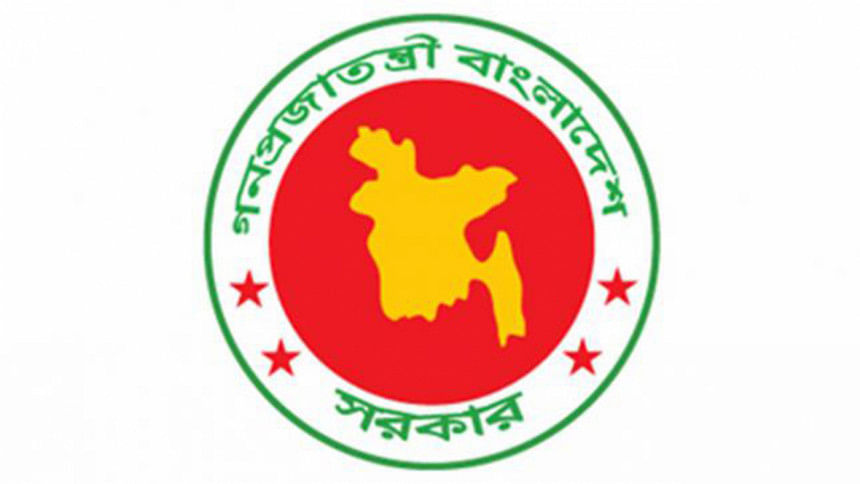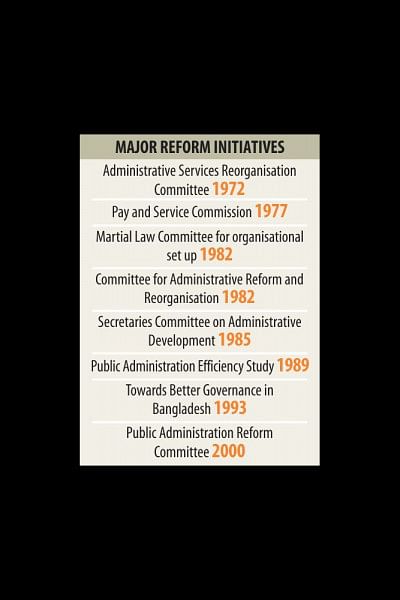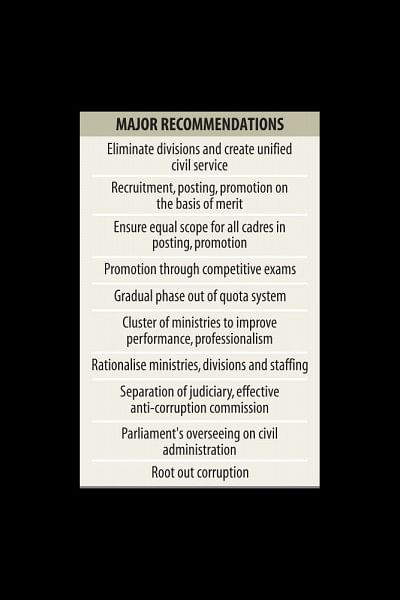Civil Service Reform Plans: Doomed all along

All the successive governments made moves to reform the civil service but none of them brought about the much-needed changes due to lack of political will and resistance from a section of bureaucrats.
Since 1972, around two dozen committees and commissions have been formed, and they made scores of recommendations for having a merit-based, efficient and service-oriented civil administration. But most of the recommendations are yet to be implemented.
"A government must have strong political will and commitment if it really wants to reform the civil administration... Bureaucracy does not like changes. Whoever is to be affected by reform will oppose it,” former secretary AMM Shawkat Ali told this newspaper.
One of the major recommendations for having a merit-based and efficient civil service is to hold competitive examinations for the posts of deputy secretary and above. "But it could not be implemented due to strong resistance from admin cadre officials," he added.
The Pay and Service Commission of 1977 recommended creating an apex cadre --Senior Services Pool (SSP) -- with talented, efficient and experienced officials drawn from all cadre services.
The formation of the SSP was proposed for ensuring equal scope for all cadre services for promotion and posting, said Shawkat.
The government doesn't want a strong and effective civil service, rather it wants a weak bureaucracy that will carry out its orders, noted the former bureaucrat.
Echoing his view, former cabinet secretary Ali Imam Majumder said, "If a government wants to run the administration efficiently and neutrally, only then it will bring about reform, otherwise not."
He also said the political parties in power try to run the administration according to their will, and want the bureaucrats to work for them. "And a section of civil servants merrily agree."
Asked whether the long-awaited reform was possible when politics seems to play a significant role in most of the affairs of the civil service, Majumder said it will be tough to bring about reform as many officials tend to show loyalty to political parties for their own benefits.
Though mandated by the constitution, no government has enacted any law to run the civil service efficiently.
Many former bureaucrats and researchers believe that the failure to bring about reform has resulted in a fall in efficiency, accountability and professionalism in the civil service, growing inter-cadre disparity and commotion, and alarming political influence on bureaucracy.
Some of the two dozen committees and commissions put forward recommendations for merit-based recruitment and promotion, elimination of disparities in cadre services, decentralisation of administrative authority, simplification of the decision-making process, combating corruption and restructuring the civil service.
Akbar Ali Khan, another ex-cabinet secretary, said, “Experts in public administration have authored a large number of reports and publications on administrative malaise in Bangladesh. In reality, very little was done to change that ...”
In his book, Gresham's Law Syndrome and Beyond: An Analysis of the Bangladesh Bureaucracy, he painted a dismal picture of the civil service in the absence of reform.
The Administrative Services Reorganisation Committee of 1972 and the National Pay and Services Commission formed in 2015 suggested restructuring the civil service.
The 1972 committee called for adopting merit as the cardinal principle for recruitment and promotion -- a suggestion put forward by many other committees.
As this could not be implemented even after so many years, experts proposed reforming or phasing out the quota system gradually.
Studying the quota system, Akbar Ali Khan and another ex-bureaucrat Kazi Rakibuddin Ahmad in 2008 proposed reforming it.
Earlier in 2000, a reform commission suggested that the government phase out the quota system.
Akbar, Shawkat and academic Mohammad Mohabbat Khan -- all of whom have penned books on the civil service -- mentioned lack of political will of successive governments as the main reason for not bringing about reform.


The 1972 committee had also recommended eliminating disparities among various classes of civil servants, scrapping the elitist cadre, and ensuring equal opportunity in recruitment, promotion and career advancement.
It also suggested that the senior policy-making and management posts be filled by the most competent civil servants.
The Pay and Service Commission of 1977 came up with similar proposals. It emphasised merit-based recruitment and promotion, and creation of the SSP.
As the SSP could not be introduced due to resistance from a section of bureaucrats, more than 75 percent of the top posts of deputy secretary, joint secretary, additional secretary and secretary are now held by officials only from the admin cadre, causing sharp division and conflicts with officials from other cadres.
According to Akbar, one of the major objectives of bringing reform in the civil service is to eliminate the admin cadre's dominance.
A number of officials at the Secretariat alleged that promotion is now given not on the basis of performance or efficiency but on political consideration, the age-old practice based on Annual Confidential Report and through lobbying.
Several reform committees suggested adopting merit as the criteria for promotion and also downsizing the number of ministries and manpower.
They also advised that layers in the decision-making process be reduced as it is too bureaucratic and takes a long time.
In 1989, a study conducted by the public administration ministry mentioned that the major constraints on ensuring efficiency in the civil service include diluted accountability, too much centralised system, too many rules and regulations, and shortage of quality human resources.
Funded by USAID, the Public Administration Efficiency Study also made some recommendations to overcome the obstacles.
In the past, several reform bodies expressed frustration over the non-implementation of their recommendations.
The 1993 Administrative Reform Committee carried out a need assessment on the ministries, divisions, departments and directorates and their manpower, and submitted 38 volumes of reports to make the civil service modern and dynamic.
It, however, expressed disappointment over the government's indifference to implementation of its recommendations.
“This underscores the fact that, from time to time, governments have gone through the motion of reform without any political commitment to it,” wrote Shawkat in his book “Civil Service Management in Bangladesh: An Agenda for Policy Reform”.
Another move to bring about reform in the civil service was made in 1996 when the then Awami League government formed Public Administration Reform Commission.
Headed by former bureaucrat ATM Shamsul Haque, the commission worked for about three years, consulted local and international experts and various stakeholders, and formulated a comprehensive roadmap on reform “Civil Administration in 21st Century”.
In its five-part report, submitted to Prime Minister Sheikh Hasina in 2000, the 14-member commission put forward 30 interim, 70 short-term and 37 long-term recommendations for reforming the civil service.
It mentioned that efficient and result-oriented civil administration was being developed all over the world under the theme of “New Public Management”.
Though some of its interim suggestions were implemented, most of its short-term and long-term measures were ignored.
Its recommendations for having Ombudsman and phasing out the quota system in public jobs gradually are yet to be implemented.
“If recruitment policy is weak, it is not possible to ensure a front-ranking civil service in a modern, democratic state,” it says, suggesting formation of Public Administration Reform Monitoring Commission to implement its recommendations.
“Reforming civil administration is a complex and continuous process for which political support is inevitable,” the head of the commission mentioned in a letter to the PM, adding that the achieved progress, experience and knowledge will go down the drain if reforms get stalled midway.

 For all latest news, follow The Daily Star's Google News channel.
For all latest news, follow The Daily Star's Google News channel. 



Comments